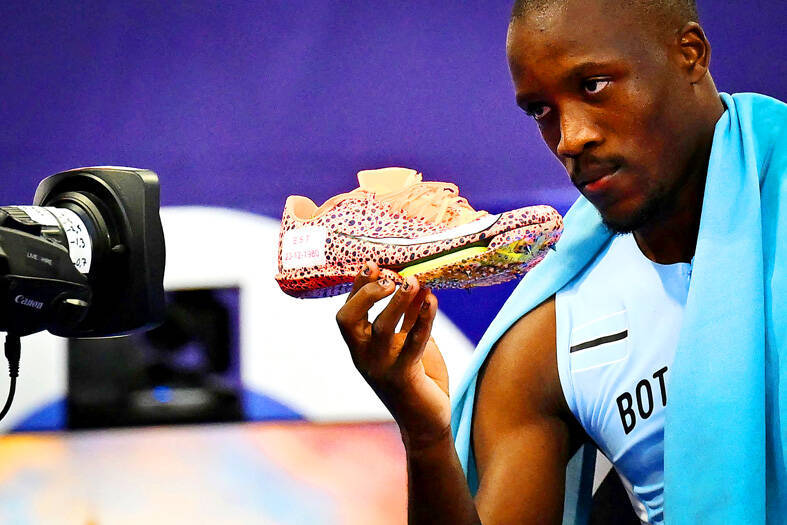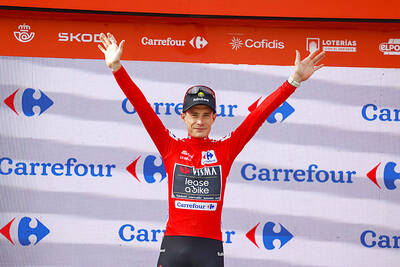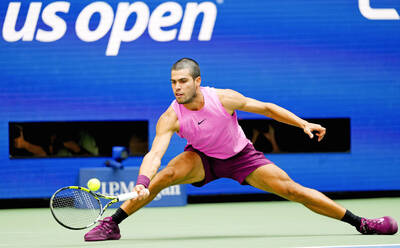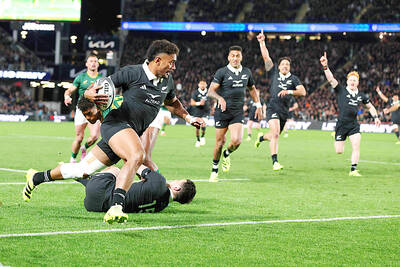Botswana’s Letsile Tebogo was the toast of Africa after winning the Olympic 200m gold on Thursday, but his immediate thoughts were much closer to home, as he dedicated his victory to his mother who died in May.
Tebogo became the first African to win the event when he ran 19.46 seconds to beat the US’ Kenny Bednarek and a COVID-19-hit Noah Lyles to claim Botswana’s first Olympic gold medal and become the fifth-fastest man in history over the half-lap.
He did it wearing spikes bearing his mother’s date of birth.

Photo: Reuters
“It’s basically me carrying her through every stride that I take,” Tebego told reporters. “Me, to take her, it gives me a lot of motivation.”
“I didn’t want to put the date of her death, because I’ll get emotional,” he said.
“I took about a month without doing anything. It wasn’t really clicking for me that she’s really gone. For me, I have to find the reason why I started my athletics journey and why I should continue going on,” he added. “[If she were here] I believe she could be one of the happiest people on the planet because she believed in me when I doubted myself.”

Photo: AFP
It was a historic day for Africa with the continent having four athletes in the final for the first time, after also providing two in the 100m final, where Tebogo came sixth and South Africa’s Akani Simbine was fourth.
Asked if his breakthrough performance could help him follow in the footsteps of Usain Bolt as the sport’s biggest name, he quietly shook his head.
“I can’t be the face of athletics as I’m not a loud or arrogant person like Noah,” he said.
Lyles was a hot topic in the post-race news conference, from which he was absent, after US officials revealed that he had tested positive for COVID-19 on Tuesday, two days after winning the 100m.
Lyles wore a face mask in the call room before the race and though Tebogo wondered why, he said he did not want to make assumptions.
Bednarek, who repeated his silver from Tokyo, was also asked about the COVID-19 situation.
“I don’t think I was put at risk,” he said. “When I found out, it wasn’t that big of a deal. He went out there and did his best while he was sick and I hope he gets better.”

Jonas Vingegaard on Tuesday claimed the overall Vuelta a Espana lead while Jay Vine earned the stage 10 victory for his second triumph of the race. Two-time Tour de France winner Vingegaard overhauled Torstein Traen’s lead to head the general classification by 26 seconds from the Norwegian, with Joao Almeida third and trailing the Dane by 38 seconds. Vine put in an unmatchable performance on the final climb to finish ahead of Spanish Movistar riders Pablo Castrillo and Javier Romo. “Back in red, I’m happy with it, it’s a beautiful jersey,” Vingegaard said. “I’m happy with how the day went,

The Kansas City Chiefs wrapped up a brief visit to Brazil on Friday with a season-opening loss to the Los Angeles Chargers, but despite the defeat, the team outshone their divisional rivals in the fight for the hearts and minds of Brazilian fans. In Sao Paulo for just the second-ever NFL game in the city, Chiefs players — especially quarterback Patrick Mahomes and tight end Travis Kelce — were treated as major celebrities throughout their stay, turning Corinthians Arena into a scene reminiscent of the Chiefs’ Arrowhead Stadium. Before kickoff, crowds of fans gathered around the Chiefs’ tunnel, eager to catch a

RIVALRY: Carlos Alcaraz lost his previous two matches against Serbia’s Novak Djokovic, in the Australian Open quarter-finals this year and Paris Olympics final last year Spain’s Carlos Alcaraz on Tuesday dazzled at the US Open to make the semi-finals before Novak Djokovic of Serbia danced his way through to book a New York showdown with the Spaniard that would mark the latest chapter in their generational rivalry. Former champion Alcaraz produced yet another entertaining display at Flushing Meadows to dismantle 20th seed Jiri Lehecka 6-4, 6-2, 6-4 at a sunbathed Arthur Ashe Stadium, securing his place in the last four without dropping a set this year. “Sometimes I play a shot that I should not play in that moment, but it’s the way I love

New Zealand stayed firm at their Eden Park fortress to claim an attritional 24-17 win over South Africa in a heavyweight clash between the world’s top two rugby sides yesterday. Under pressure after conceding a first-ever defeat on Argentine soil against the Pumas two weeks ago, the All Blacks responded with a performance of grit and discipline to stretch their unbeaten run at their Auckland stronghold to 51 matches. Two well-taken tries by Emoni Narawa and Will Jordan set up a 14-3 lead at halftime before Quinn Tupaea grabbed a third five-pointer for the hosts 13 minutes from time. Well-held for most of